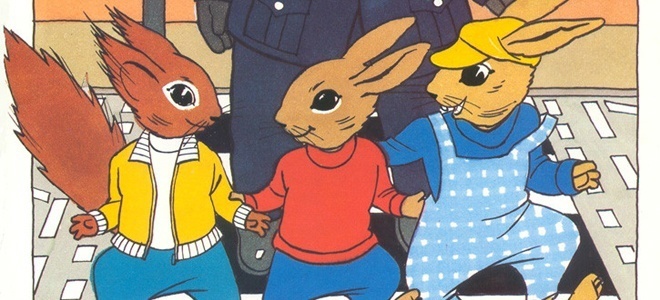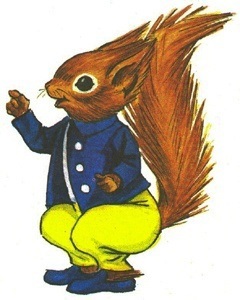
FAMOUS SQUIRREL HONOURED IN LONDON EXHIBITION
Are you sitting comfortably? Than I’ll begin.
Back in the days of innocence and Green Cross Codes, before PlayStations, iPads and texting, there was once a red squirrel called Tufty Fluffytail who was the face of the Royal Society for the Prevention of Accidents’ (RoSPA) road safety campaigns throughout the 50s, 60s, 70s and even into the 80s and 90s.

Born in 1953 as a creation of the late Elsie Mills MBE in order to promote safety messages for children in a simple yet informative way, Tufty and his friends - Minnie Mole, Willy Weasel (who was a bit naughty and always got into scrapes and need telling off and rescuing), his teacher Mrs Owl and Policeman Badger (who was always there to pop up just in time to save the children) – featured in original stories that featured many adventures and situations that children of the time would find themselves in.
Following on from these stories, in 1961, the Tufty Club was set up as a nationwide network of local groups to help continue to promote the messages of road safety, giving out around 30,000 books about road safety to parents. Although the original membership of the club was to the under-fives, in 1962 this was expanded to admit older children who had been clamouring to join, reportedly mithering their parents to death.
At its peak there were 24,500 registered Tufty Clubs with membership reaching - and passing – 2,000,000 in 1972, and even the Royal Family joined in with HRH Princess Michael of Kent becoming the first president of the Tufty Club in 1979 when Tufty underwent a makeover to keep him up to date with the times.

He was re-styled and modernised in 1993 before embarking on a nationwide tour of the country the following year; but by then time had caught up on the old fella, and considering that the average lifespan of a red squirrel is a mere 3 years (10 in captivity), the 41 year-old dressed in his signature blue and yellow clothing had done very well to get this far, and retired to a secret squirrel sanctuary somewhere in the UK with a never-ending supply of seeds and nuts in his drey.
Now, as part of an exhibition in London which explores “international state-related propaganda from the 20th and 21st centuries,” which opened on 17 May at the British Library, Tufty will be coming out of retirement/hibernation until September 17.
The exhibition, entitled ‘Propoganda: Power and Persuasion’, features state-related propaganda from all around the world, and is separated into six different sections - origins; nation; war; enemy; health; and ‘propaganda in the 21st century.’
The Tufty section features memorabilia from the Great British icon drawn from the archives of the British Library and includes a bag and greetings card as well as a RoSPA poster from the 1960s featuring statistics about children and road accidents. All the Tufty material is displayed alongside other examples of “the ways in which state organisations, and those with close links to the state, attempt to change behaviour and influence attitudes on a range of issues relating to health and risky behaviour.”

Tom Mullarkey, chief executive of RoSPA, a safety charity with a great history itself stretching back 97 years, said: “The exhibition is a wonderful opportunity to mark Tufty’s 60th birthday and to acknowledge his contribution to society. Tufty was an iconic aid to road safety education, teaching generations of children right through the 60s and 70s and into the 80s and 90s. Although it might seem strange to consider him as propaganda, the British Library’s exhibition is a fitting reminder of Tufty, his powers of persuasion and his enduring legacy as artwork.”
Jude England, head of social sciences at the British Library and curator of Propaganda, said: “Tufty is featuring in our exhibition as a wonderful example of a successful propaganda campaign. At its peak in the early 1970s, around two million children were members of local Tufty Clubs.
“The best public health campaigns use a number of techniques to relate their messages, ranging from shocking to humorous; Tufty’s appeal lay in the friendly images and accessible language used, for example, in the ‘kerb drill’. We expect that the Tufty exhibits will evoke childhood memories for many of the visitors to the exhibition.”
Although Tufty did make a bit of a comeback in the BBC TV series ‘Life On Mars’ in April 2007 when DCI Gene Hunt (Philip Glenister) donned a Tufty costume to escape detection when being sought for murder - DI Sam Tyler (John Simm) helped him after spotting Tufty being used in a school road safety lesson – it was a fleeting cameo appearance, and he was soon back to the retirement tree.
Tufty has his own web page - www.tuftyclub.org.uk - and still features on educational material that the RoSPA produces to help to educate children.
Good work fella!

